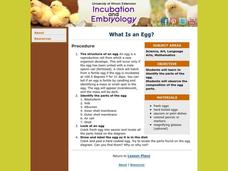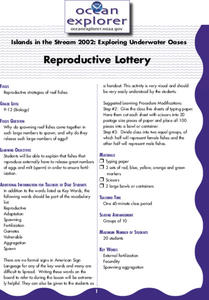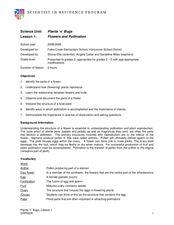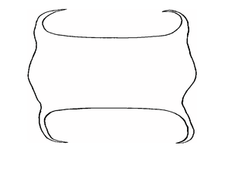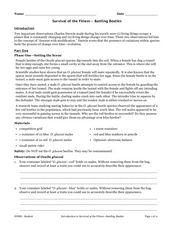Curated OER
What Is an Egg?
Students identify the parts of the egg and observe the composition of the egg parts.
Curated OER
Zebrafish Development
Middle schoolers examine the early development of zebrafish as a model for embryo development in humans. They observe various stages of zebrafish reproduction from sperm and eggs to fertilized eggs and hatchlings.
Curated OER
Reproductive Lottery
Students explain that fishes that reproduce externally have to release great numbers of eggs and milt (sperm) in order to ensure fertilization.
Curated OER
Flowers and Pollination
Young scholars explore the environment by researching plant reproduction. In this pollination instructional activity, students define botany related vocabulary terms such as disc flower, petal and fertilization. Young scholars dissect a...
Curated OER
Skates
Students gain understanding of structure, characteristics, and basic needs of living things and their role in world, identify parts of skate, observe details of skate's body and skate egg case, and identify unique characteristics of skates.
Curated OER
Eighteen Ways to Make a Baby
Learners view a video clip about post-menopausal women having children. They identify the ethical, legal and social implications of this. They also read a case study.
Curated OER
Survival of the Fittest -- Battling Beetles
Learners experiment with traits. In this Science instructional activity, students test the strength of beetles using M&M candies in lieu of the insects. Learners use the Hardy-Weinberg Equation to calculate possible offspring traits...
Curated OER
LP 6--8: Xenopus laevis (frog) Development for a 7th Grade Audience
Seventh graders view lab stations with Xenopus at different stages of development. They identify the life stage of the sample, as well as the previous and next stages. Students must explain their reason for selecting the specific stage.
Curated OER
Fruit Fly Ranch Activity
Seventh graders describe how the traits of an organism are passed from generation to generation. They distinguish between asexual and sexul reproduction. Students identify traits through genes and those resulting from interactions with...
Curated OER
What Happens in the First Nine Months?
Pupils identify their feelings and learn constructive ways of handling conflict. For this conflict lesson students discuss their feelings and when they are feeling a certain way what they can do to remedy the situation.
Curated OER
Embryology as Evidence of Evolution
Students observe the two major developmental pathways (protostome and deuterostome). They analyze data regarding differences in nucleotide sequences and construct a phylogenetic tree. They observe the similar evolutionary history shared...
Curated OER
Pollen & Pollination
Students identify the different ways things are pollinated and how to manage pollen. In this pollination lesson plan students complete an experiment on how moths pollinate flowers.
Curated OER
Dragon Genetics-Independent Assortment and Genetic Linkage
Students build chromosome models using popsicle sticks. In this biology lesson, students simulate the Law of Independent Assortment. They use Punnett squares to predict the resulting genotype and phenotype.


